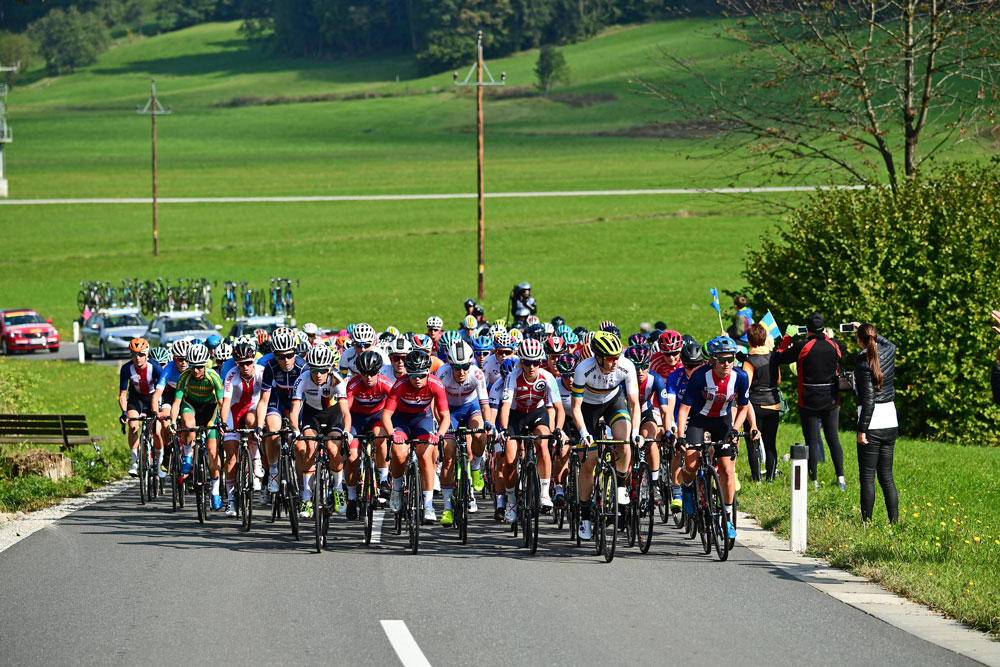UCI reveal more details of minimum wages and other changes to women’s racing
Cycling’s governing body is pushing for a more professional women’s peloton


The women's peloton at the UCI Road World Championships 2018 in Innsubruck. Image: Sunada
The latest race content, interviews, features, reviews and expert buying guides, direct to your inbox!
You are now subscribed
Your newsletter sign-up was successful
The UCI has revealed more details of long-awaited changes to the women’s peloton.
A new structure for professional women’s professional road cycling will come into force at the start of the 2020 season, more closely resembling the men’s side of the sport.
The will UCI split women’s races into four categories – the UCI Women’s WorldTour, the UCI ProSeries, Class One and Class Two.
>>> British women’s circuit racing to be held as national series for the first time
WorldTour category will consist of a maximum of 23 events, while the ProSeries will feature between 20 and 30 races, then around 25 races for Class One and 30 for Class Two.
Organisers of the top two tiers – WorldTour and ProSeries – will have to abide by strict standards, particularly focused on TV production.
There will be two types of women’s teams from 2020, the UCI Women’s WorldTeams and UCI Women’s Continental Teams.
The latest race content, interviews, features, reviews and expert buying guides, direct to your inbox!
WorldTeams will be made up of between nine and 16 riders for the first two seasons of the new system, rising to between 10 and 20 riders by 2022.
Continental teams will consist of between eight and 16 riders.
There will be a maximum of 15 teams at WorldTeam level, who will be selected based on sporting, ethical, financial and administrative criteria to be set out in 2021.
>>> The Women’s Tour 2019: everything you need to know
Expiry times for WorldTeam licences will change over the first few years of the new system, but by 2024 the duration of licences will depend on the team’s ranking.
A WorldTeam could be demoted if a Continental team are deemed to be better when considering the criteria.
WorldTeams will be able to recruit two trainees every year, between August 1 and December 31.
WorldTour events will be mainly open to WorldTeam and Continental outfits, with a minimum of 15 teams taking part and a maximum of 24.
ProSeries events will be open to WorldTeams, Continental teams, national outfits and regional clubs.
Class One events must have 15 teams on the start line, made of Continental, national and regional teams but not WorldTeams.
Class Two races must feature a minimum of 10 teams of four riders, from all team categories except WorldTeams.
As of 2020, UCI WorldTeams will be required to pay their riders a minimum salary, excluding prize money.
The salary will be €15,000 in 2020, €20,000 in 2021, €27,500 in 2022 and then from 2023, the same as that paid to existing men’s Pro Continental rider, around €30,000.
Neo-pro status will be introduced for WorldTeams from 2023.
Alongside this changes to the system, the women’s peloton will also be given a maximum of 75 days of racing each year (excluding national team or individual appearances), sickness cover, maternity cover, a pension scheme from 2022 and other types of cover including hospitalisation and repatriation, accident and life insurance.
Between 2019 and 2022, the UCI will also contribute to a 10 per cent increase per season in prize money for the top 20 riders in each race.
Prize money will also be made available to riders finishing 16th to 20th in stage races.
WorldTeams and Continental teams will also be given a participation allowance for WorldTour and ProSeries events.
Alex Ballinger is editor of BikeBiz magazine, the leading publication for the UK cycle industry, and is the former digital news editor for CyclingWeekly.com. After gaining experience in local newsrooms, national newspapers and in digital journalism, Alex found his calling in cycling, first as a reporter, then as news editor responsible for Cycling Weekly's online news output, and now as the editor of BikeBiz. Since pro cycling first captured his heart during the 2010 Tour de France (specifically the Contador-Schleck battle) Alex covered three Tours de France, multiple editions of the Tour of Britain, and the World Championships, while both writing and video presenting for Cycling Weekly. He also specialises in fitness writing, often throwing himself into the deep end to help readers improve their own power numbers. Away from the desk, Alex can be found racing time trials, riding BMX and mountain bikes, or exploring off-road on his gravel bike. He’s also an avid gamer, and can usually be found buried in an eclectic selection of books.
